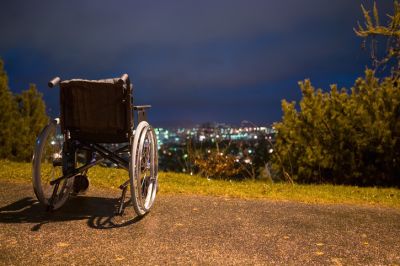 If you’ve seen any mass media coverage about Stephen Hawking’s passing this past March, you’ve probably witnessed praise of the late physicist that he “surpassed his disabilities” and excelled despite them. You might have even seen memes on social media that appear to depict Hawking walking into the greater cosmos. While at first glance these may seem like positive depictions, they could contribute to troubling narratives around disability and death.
If you’ve seen any mass media coverage about Stephen Hawking’s passing this past March, you’ve probably witnessed praise of the late physicist that he “surpassed his disabilities” and excelled despite them. You might have even seen memes on social media that appear to depict Hawking walking into the greater cosmos. While at first glance these may seem like positive depictions, they could contribute to troubling narratives around disability and death.
“Inspirational” and Problematic
In a March 2018 BBC News op-ed piece, journalist Ellis Palmer described some of the public discourse about Hawking after his death on March 14, 2018. First, Palmer took issue with media coverage that “created a narrative of an ‘inspirational’ figure who was ‘crippled’ by his condition and ‘confined to a wheelchair.’” Moreover, Palmer displayed a widely shared image on social media showing a motorized wheelchair and presumably the outline of the late Hawking walking out of the chair.
While the authors of such sentiments may mean well, news reports and social media memes like the ones critiqued by Palmer could be classified as “inspiration porn.” The late disability activist Sheila Young explained the concept in a 2012 Australia Broadcasting Corporation news piece, detailing that it usually consists of images depicting people with disabilities as “extraordinary” or “inspirational” for simply performing everyday activities. Furthermore, Young criticized journalists for using phrases such as “defying the odds,” or “wheelchair-bound.” To thinkers like Palmer and Young, they reinforce ableist notions that could judge disabled people harshly based on their inability to “overcome” their conditions.
Defining Ableism and Its Characteristics
In a 2018 Huffington Post Canada article, writer Annette Ejiofor documented more reactions by disabled individuals all over social media, with some calling news reports and memes out for ableism. This type of discrimination is defined by the Ontario Human Rights Commission as “attitudes in society that devalue and limit the potential of persons with disabilities.” Ableism can encompass concepts and practices such as:
- Viewing disabled people as burdens
- Stereotypes depicting them as bitter and wishing for death
- Assumptions about a person’s presumed competence
- Limiting access to tools and facilities needed to survive and thrive
- Refusal by abled people to befriend, date, or marry disabled individuals
- Passing over disabled people for work or educational opportunities
Stephen Hawking accomplished much of his life’s work thanks to supportive tools such as his motorized chair, a customized computer, and synthesized speech modules that allowed him to travel, teach, and express his innovative ideas. In fact, Hawking himself called for the need to remove accessibility barriers. Los Angeles Times writer Jessica Roy also reveals that he rejected an offer from Intel to use a less-robotic voice for his speech synthesizer, preferring the mechanical version he’d used since the 1980s. For those and other reasons, it’s impossible to separate this famous scientist from his disability.
Impacts on Disabled People in Death
The unfortunate effects of ableism become especially troubling when it comes to end-of-life issues. Roy divulged in her L.A. Times article that some of the backlash over how Hawking was memorialized centered around the meme’s erasure or maligning of his disability. Even more disconcerting, the idea that being disabled is worse than death can result in negative health care outcomes or even premature death. Several grassroots groups, including Not Dead Yet and American Disabled for Attendant Programs Today (ADAPT), oppose laws permitting assisted suicide due to concerns that they could lead to limited care options, elder abuse, and disabled individuals opting for euthanasia to avoid being “burdens.”
Respecting the Whole Individual
Debates about discrimination and ableism continue, with activists and writers calling for greater understanding, inclusion, and fair treatment. While these are key issues in the lives of people with disabilities, it’s also important to remember them respectfully in death, taking an approach to memorialization that honors the whole individual.
Add Your Comment